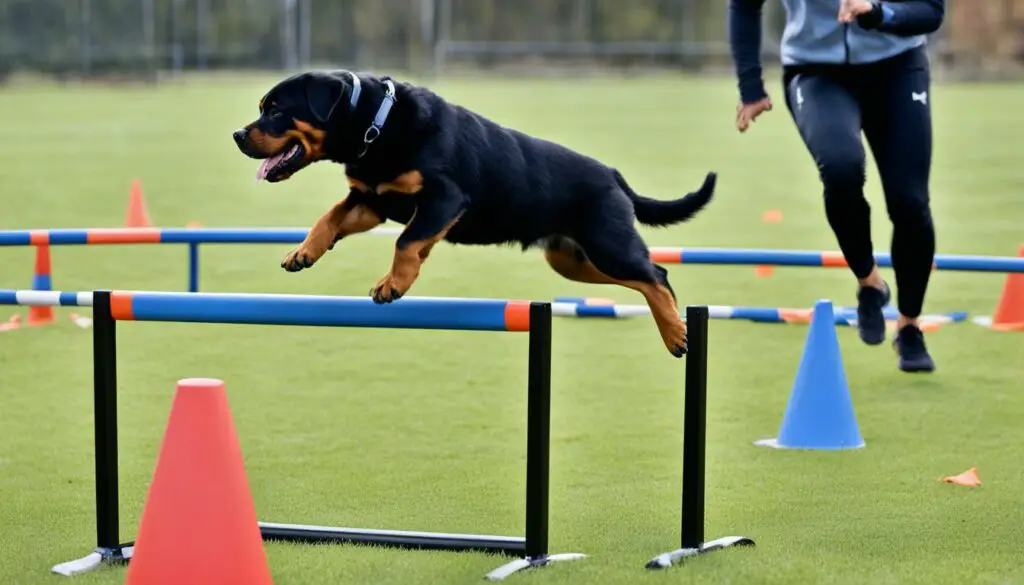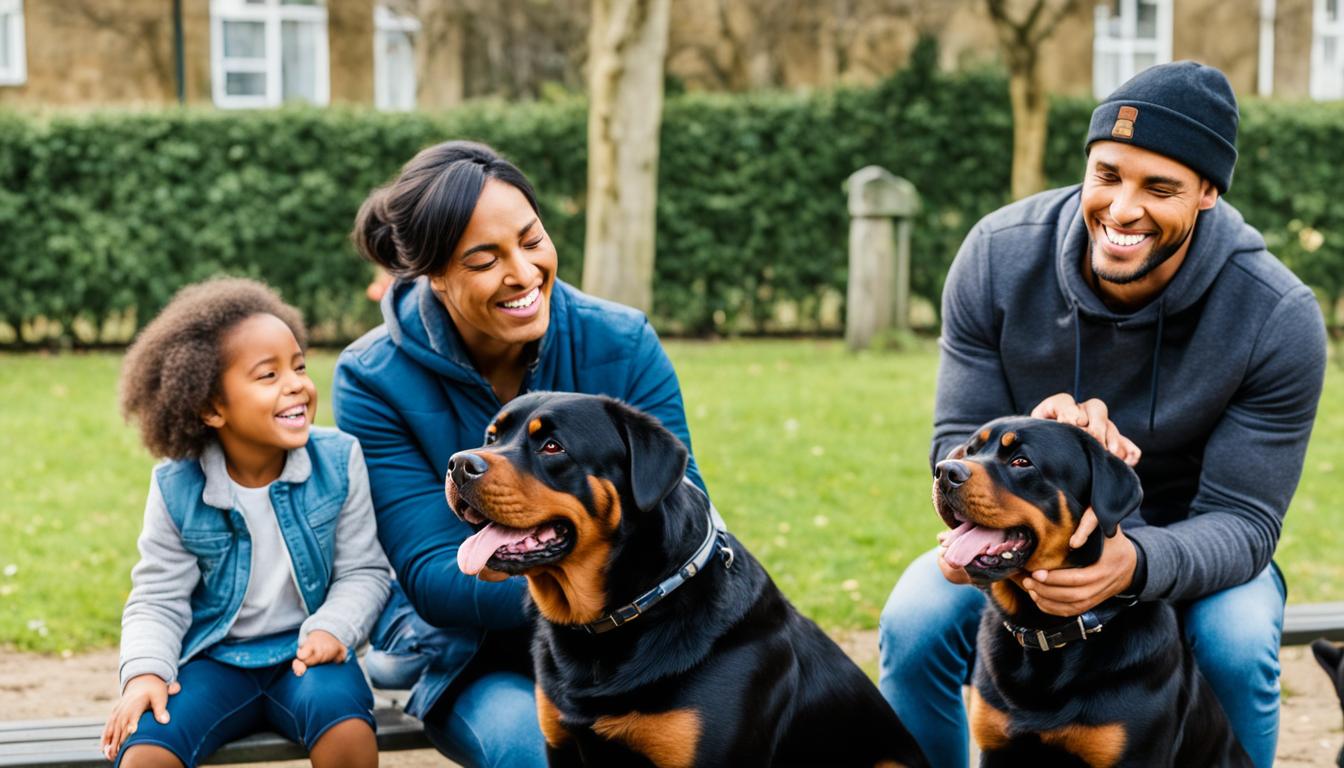In this article, we will delve into the temperament of Rottweilers and the specific challenges they may present for first-time owners.
Discover valuable insights and practical tips for effectively training Rottweiler puppies. We’ll also help you fulfill their exercise and mental stimulation requirements.
Additionally, we will discuss essential care tips for inexperienced owners and share success stories of first-time Rottweiler owners thriving with their beloved pets.
Are Rottweilers Good for First-Time Owners
Inexperienced owners may face various challenges when considering Rottweiler ownership. These challenges include difficulties in training, handling their strength and size, and managing their protective instincts.
Training a Rottweiler requires patience, consistency, and firmness to establish boundaries and promote proper behavior. Novice owners must also prepare themselves for the commitment of owning a Rottweiler in terms of time and finances.
Owning a Rottweiler demands a significant investment of time and energy. They require ample exercise, mental stimulation, and socialization to thrive.
Additionally, the financial responsibility for their healthcare, including regular veterinary check-ups and vaccinations, should not be overlooked. However, with proper preparation and commitment, owning a Rottweiler can be a rewarding experience.
The Rottweiler Temperament and First-Time Owners
Rottweilers have a unique temperament that can pose challenges for first-time owners.
Understanding the Protective Nature of Rottweilers
Rottweilers are renowned for their protective nature, a trait that can be both beneficial and demanding. Their innate inclination to safeguard their loved ones and territory makes them outstanding watchdogs.
Yet, this protective instinct may lead to aggression or excessive protectiveness if not handled and trained appropriately.
Managing a Rottweiler’s Strength and Size
One of the primary considerations for first-time owners is the strength and size of Rottweilers. These dogs are large and powerful, requiring owners to have the physical strength and ability to handle them confidently.
Establishing clear boundaries and teaching proper leash manners is essential to prevent potential issues due to their size and strength.

Rottweiler Behavior: A Mix of Intelligence and Willfulness
Rottweilers are intelligent and determined dogs, quick learners who thrive in diverse training exercises.
However, their independent nature can lead to willfulness and a desire to assert dominance if not properly guided.
Consistent and firm training methods are crucial to harness their intelligence and maintain control over their behavior.
Training Essentials for Rottweiler Puppies
Training is an essential part of owning a Rottweiler puppy. It not only helps them develop good manners and behavior but also ensures their safety and the safety of others.

Obedience Training: Training your Rottweiler puppy is essential for mastering basic commands like sit, stay, come, and heel. Enrolling in puppy training classes provides professional guidance and helps your puppy socialize with other dogs.
Socialization: Early socialization is critical to raising a well-adjusted and confident Rottweiler puppy. Introduce them to various environments, people, animals, and experiences to foster good social skills and avoid fear or aggression issues later on.
House Training: House training is essential for Rottweiler puppy training. Establish a consistent routine for potty breaks, reward your puppy for eliminating in the designated spot, and be patient during the process. Positive reinforcement and consistent cues will help your puppy understand where and when to relieve themselves.
Crate Training: Crate training can benefit Rottweiler puppies by providing them with a safe and comfortable space. Introduce the crate gradually, make it a positive experience by introducing treats and toys, and never use it as punishment. Crate training helps with house training, prevents destructive behavior, and provides a secure place for your puppy when you cannot supervise them.
Exercise and Mental Stimulation for Rottweilers
Rottweilers thrive on regular physical activity and mental engagement to keep their bodies and minds in shape.
Creating an Effective Exercise Routine for Your Rottweiler
An exercise routine is crucial for meeting your Rottweiler’s exercise needs. Regular physical activity helps to release pent-up energy, promote muscle development, prevent obesity, and enhance overall health. Providing at least 60-90 minutes of daily exercise for adult Rottweilers is recommended.
Some effective exercise options for Rottweilers include:
- Brisk walks or jogging
- Running or hiking in a secure, fenced area
- Swimming
- Playing fetch
- Engaging in canine sports like agility or obedience training
The Importance of Mental Challenges and Interactive Play
In addition to physical exercise, mental challenges, and interactive play are essential for keeping your Rottweiler mentally stimulated and engaged. Rottweilers are intelligent dogs and thrive on mental stimulation as much as physical activity.
Here are some ways to provide mental challenges and interactive play for your Rottweiler:
- Engage in puzzle games and toys that require problem-solving and decision-making
- Hide treats or toys around the house or yard for your Rottweiler to find
- Teach new commands and tricks to stimulate their learning abilities
- Provide interactive toys that dispense treats when manipulated
- Rotate and introduce new toys to keep their interest
Rottweiler Care Tips for Inexperienced Owners
Caring for a Rottweiler requires proper knowledge and attention, especially for first-time owners.
Grooming
Grooming is an essential aspect of Rottweiler care. Regular brushing helps maintain their coat’s shine and removes any loose hair. Brushing your Rottweiler at least once a week is recommended. Additionally, regular bathing should be done to keep them clean and odor-free.
Feeding
Ensuring your Rottweiler stays healthy involves giving them a well-balanced diet. It’s important to choose high-quality dog food designed for large breeds. Consult your vet to determine the right portion sizes and feeding schedule for your Rottweiler.
Health Care
Rottweilers require regular veterinary check-ups to monitor their health and prevent potential issues. Vaccinations are essential to protect your Rottweiler from common diseases, so follow the recommended vaccination schedule provided by your veterinarian. Dental care is also essential, so brush your Rottweiler’s teeth regularly and provide dental chews to maintain oral health.
| Vaccine | Age | Frequency |
|---|---|---|
| Distemper | 6-8 weeks | Every three years |
| Parvovirus | 6-8 weeks | Every three years |
| Hepatitis | 6-8 weeks | Every three years |
| Parainfluenza | 6-8 weeks | Annually |
| Rabies | 12 weeks | Every 1-3 years, depending on local regulations |
Table: Rottweiler Dental Care
| Activity/Item | Frequency |
|---|---|
| Brushing | Daily |
| Dental Chews | 3-4 times per week |
| Professional Teeth Cleaning | As recommended by the veterinarian |
Choosing a Rottweiler: Factors to Consider Before Adoption
Before inviting a Rottweiler into your home, it’s essential to weigh several factors to ensure a smooth and enjoyable experience. Taking the time to evaluate these aspects will equip you to make a thoughtful decision and establish the groundwork for a successful and satisfying relationship with your new canine companion.
Start by examining your lifestyle. Determine whether a Rottweiler is compatible with your daily routine and preferences. These dogs thrive in active settings and necessitate consistent physical activity and mental engagement to maintain their well-being and happiness.
If you prefer a more relaxed lifestyle with less time for daily walks and play, a Rottweiler might not be the ideal pet choice for you. However, if you are active or have a family that loves outdoor activities, Rottweiler’s energy and enthusiasm could be a perfect match.
Furthermore, consider your living situation and family dynamics. Rottweilers are known for their protective nature and can be cautious around unfamiliar people or animals.
If you live in an apartment or have frequent visitors, proper socialization and training will ensure your Rottweiler becomes well-rounded and comfortable in various social situations.
Additionally, Rottweilers are generally excellent with families, but it’s important to supervise interactions between young children and dogs to ensure safety and prevent incidents.
Finally, evaluating a Rottweiler’s temperament is vital. These dogs can exhibit a range of personalities, from confident and outgoing to more reserved and cautious.
Before adoption, spend time with the Rottweiler you are considering, observe its behavior in different environments, and interact with it to gauge its compatibility with your temperament and lifestyle.
Consulting breed information and engaging with experienced Rottweiler owners can offer valuable insights into the breed’s typical traits and tendencies.
FAQ
Are Rottweilers good for first-time owners?
Rottweilers may not be ideal for first-time owners due to their size, strength, protective nature, and potential training challenges. However, with proper understanding, training, and commitment, first-time owners can still have a successful relationship with a Rottweiler.
What is the temperament of Rottweilers?
Rottweilers are known for their protective nature, strength, and size. They also exhibit a mix of intelligence and willfulness, which can make training and handling them a bit more challenging for inexperienced owners.
What are the training essentials for Rottweiler puppies?
Training essentials for Rottweiler puppies include obedience, socialization, and house and crate training. These techniques are essential for shaping a Rottweiler’s behavior and ensuring they become well-adjusted and obedient adult dogs.
How much exercise do Rottweilers need?
Rottweilers are a lively and energetic breed, needing consistent exercise and mental engagement. Establishing a well-rounded exercise plan and offering interactive play and mental activities are crucial to ward off boredom and address behavioral issues.
What are some care tips for Rottweiler owners?
Care tips for Rottweiler owners include grooming needs, feeding recommendations, health care tips such as vaccination schedules and dental care, and general maintenance advice to keep your Rottweiler healthy and happy.
What challenges do first-time Rottweiler owners face?
First-time Rottweiler owners face challenges such as training difficulties, managing their strength and size, and handling their protective instincts. Additionally, preparing for the commitment of Rottweiler ownership, both financially and time-wise, is essential.
What factors should I consider before adopting a Rottweiler?
Factors to consider before adopting a Rottweiler include your lifestyle, living situation, family dynamics, and evaluation of a Rottweiler’s temperament and socialization. These factors will help ensure a suitable match and a prosperous and harmonious relationship.


